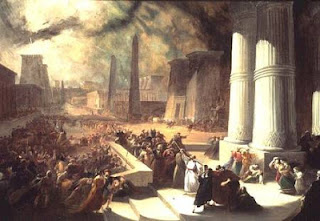THERE IS LOVE IN DIVINE JUDGMENTS
In general we see things, situations
and the world from perspectives that we acquire throughout life. Therefore, a
certain fact can receive several interpretations. However, our value judgments
do not always correspond to reality, because things and situations have their
own intrinsic senses regardless of the opinions and visions they receive.
How to understand the plagues allowed
by God over Egypt? They transformed the greatest economic and military power of
the time into a devastated country. And what about the last plague? The text
says, "At midnight the LORD struck down all the firstborn in Egypt, from
the firstborn of Pharaoh, who sat on the throne, to the firstborn of the
prisoner, who was in the dungeon, and the firstborn of all the livestock as
weell" (Exodus 12.29). Would God delight in human suffering? Is He evil?
In the book of the prophet Naum it is
written, "The Lord will not leave the guilty unpunished" (1.3). Evil
will not prevail or go unpunished. Accepting this means seeing this question
from the divine perspective and not ours. Egypt represents the typical man-made
world after the Fall in which many gods are worshiped, but not the Creator; and
the human being is reduced to mere object of exploitation by the stronger one.
In those judgments, God has shown that this system will not be perpetuated, but
it will have an end.
An accurate reflection will show that
in those plagues, in those divine judgments there was love. He did not need to
reach the tenth judgment; only came because of Pharaoh's obstinacy. Love was in
the fact that at the same time the pain came upon the Egyptians; salvation came
upon the Jews. There is love in the divine judgments, but it is necessary to
understand that for the good to prevail; evil must be extirpated. It follows,
then, that love involves a certain amount of suffering. But this is not by divine
will, but by the human condition of decay.
He sent a flood upon mankind to purge
it, for evil had become widespread. Israel was taken into the Babylonian
captivity so that it would not be extinguished in the practices of the
Canaanite religion. The Apocalypse is the narrative of his judgments to put an
end to this world system and establish an order in which He Himself will live
with men. And what about his own sacrifice in the person of the Son, for man,
delivering him from the condemnation of eternal death? There is love in divine
judgments.
Brunner (2010, p.301), in his
Dogmatic, speaks of this "dialectic tension between Wrath and Mercy"
of God. He writes:
Even in hell, God is present, not as the God
revealed in Jesus Christ as Love, but in his wrath, which is a Consumer Fire.
Where Jesus Christ is, there is Light and Salvation; where Light and Salvation
are not present, Jesus Christ is not present. But God is still there, as the
God of Wrath: "Whoever believes in the Son has eternal life, but whoever
rejects the Son will not see life, for God's wrath remains on them" (John
3:36) (BRUNNER, 2010, p. 298).
This aspect of being God can be
difficult for man to understand and accept, because the fallen human being has
his visions about Him and lives the illusion of wanting to domesticate Him.
Brunner (2010, p.299), however, points out that "the mystery of God is not
exhausted by the Son". "This freedom of God, for the purpose of
salvation and judgment, light and darkness, life and death, is the inscrutable
mystery of God, which even in the revelation of the Son remains a mystery.
Antônio Maia – M.Div.
Copyright
BRUNNER, Emil. Dogmática – Vol 1,
Doutrina Cristã de Deus. São Paulo: Fonte Editorial, 2010


